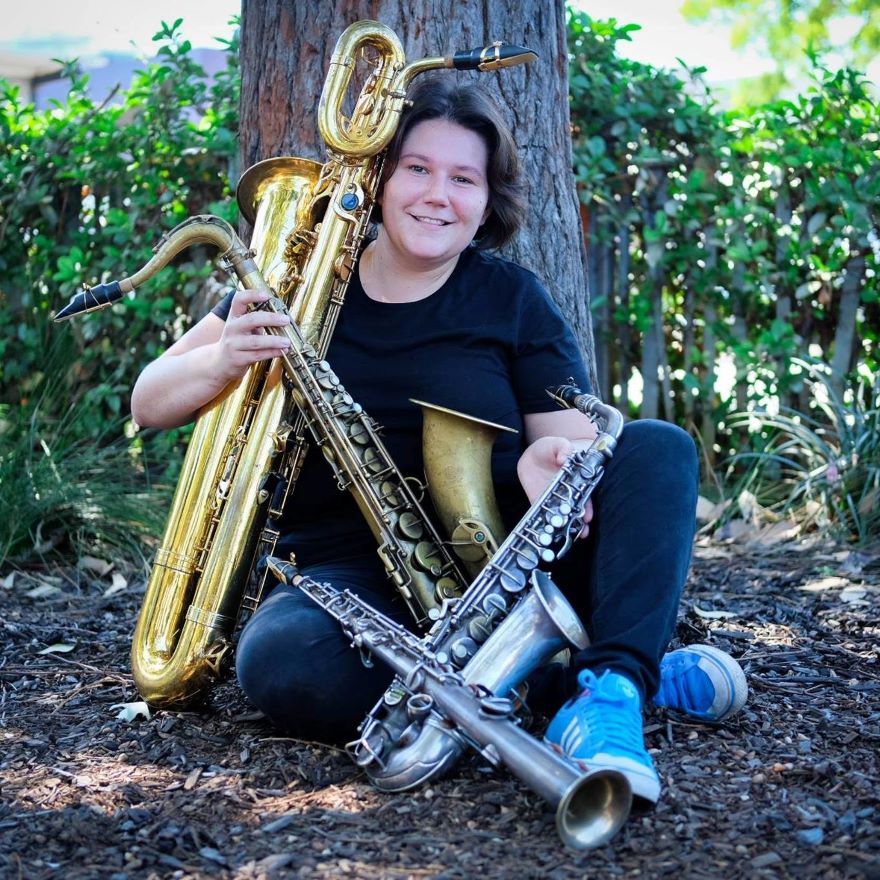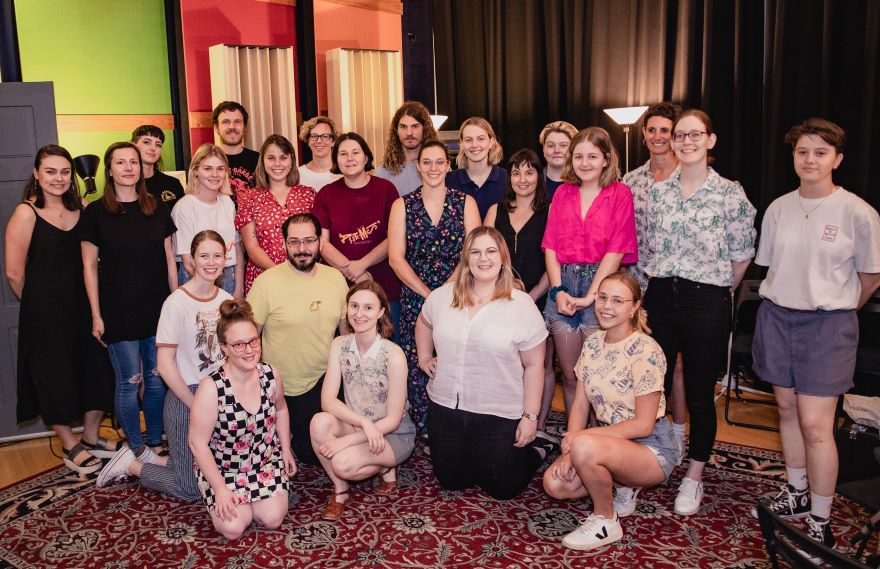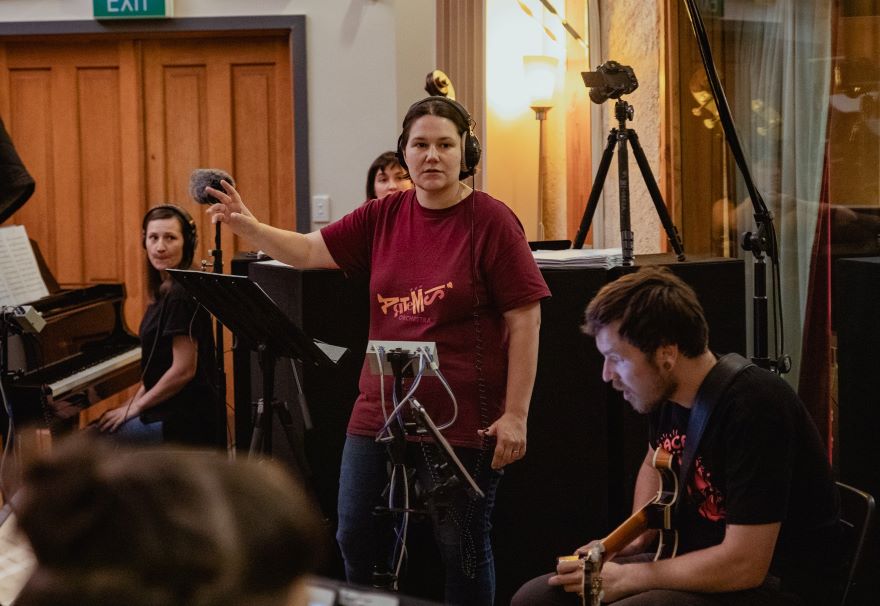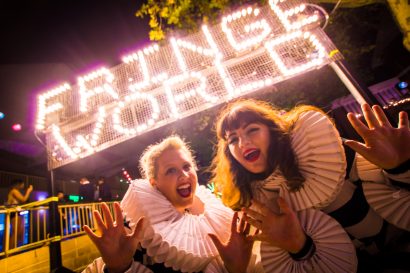After years of witnessing gender inequality in the jazz world, Gemma Farrell is calling it out with the release of an ambitious debut album by the Artemis Orchestra.
Women in jazz – the elephant in the room
17 June 2021
- Reading time • 10 minutesMusic
More like this
- Rewriting tradition with skill and charm
- Close encounter stirs the soul
- The great unknown
There’s a strange incongruence about jazz. It is a global music genre built around improvisation and freedom with its origins in marginalised racial groups, yet over the past century jazz has become an industry dominated by white men.
Despite gradual improvements in recent years, the majority of jazz recordings ranked in America’s National Public Radio Jazz Critics Poll between 2017-2019 included no women musicians among their core personnel.
The jazz industry’s sluggardly approach to gender and racial diversity continues to impact on new generations of Australian musicians who often do not feel welcome in the industry.

Gemma Farrell won the 2020 WAM best brass, woodwind or string instrumentalist of the year and is highly regarded as a saxophonist, band leader and composer. But her trajectory as a musician hasn’t always been smooth sailing.
Her years as a student at the West Australian Academy of Performing Arts were a struggle and Farrell only began to thrive when she moved to the east coast in 2008 and discovered female role models such as saxophonist Sandy Evans and Dr Louise Denson, Head of Jazz at Queensland Conservatorium and the only full-time female tertiary instrumental teacher in Australia.
“WAAPA’s a really welcoming place now and I’m now lecturing and doing my PhD there, but when I was an undergrad it was very competitive,” Farrell explains. “When I finished in Perth, I had been made to feel not welcome. I’d almost given up playing the sax and I’d lost a lot of confidence and a lot of joy.”
Women in jazz have traditionally been singers, typically regarded as entertainers and not fundamental to jazz as “serious” artists. Few female instrumentalists, composers, arrangers and bandleaders have become part of the jazz story.
“Last time I looked at the statistics about one quarter of professional jazz musicians worldwide are female,” says Farrell.
She recalls watching the Australian National Jazz Orchestra perform with only two women on stage. In 2020 when the ABC released its list of Australia’s 100 favourite jazz artists the numbers were equally disconcerting.
“It didn’t have many Australians on it and hardly any women at all. Six percent of them were women and most of them were singers.”
Changing the tune
But Farrell is on a mission to change that. In 2017 she founded the Artemis Orchestra, a big band promoting people of marginalised genders.
“We founded the band around the same time as the #MeToo era. It was clear to me more than ever before that women, non-binary and trans people in Perth needed a safe place to play jazz and encourage each other.”
Farrell remembers the first time she played in an all-female big band, organised by pioneering bass player Linda May Han Oh.
“The first couple of minutes of that rehearsal all the girls were looking around going ‘Whoa this is weird!’ We were used to being the elephants in the room, the one of maybe three girls in the big band. So it was really cool.
“There is the saying ‘you have to see it to be it’. That’s why I started Artemis. I felt like women needed more assurance that they could do jazz. I’ve been in a professional band as the only girl and feeling like if I take a bad solo or if I make a mistake, I’m representing all women in jazz. It’s not nice to feel like I can’t stuff up because there is so much on the line. I just wanted to have a group where people, especially my students and young girls and non-binary people, could look at us and go ‘I’m capable because they’re capable’.
“I’ve had some bad experiences in the past but I now separate that from the music and I see now what a wonderful collaborative music jazz can be, and I try to make everyone feel welcome, because no one has ownership over music.”
Calling out the elephant in the room
The Artemis Orchestra will launch their debut album this month, the culmination of years of work since the orchestra was founded in 2017. The album is called Elephant in the Room and the name comes from a track on the album written by Kate Pass, who also plays double bass on the album, and refers to the fact she feels like the elephant in the room when she’s the only woman in a band of men.
It is one of ten original compositions by women composers from Perth, including two pieces by Farrell, who also conducts the ensemble. Several of the musicians performing on the album are emerging artists from the Young Women in Jazz program that Farrell has been running with the WA Youth Jazz Orchestra since 2015.

For trumpet player Charlie Teakle the opportunity to perform alongside their mentors has been transformational.
“When I was a kid, I would never have imagined an entire music group of all women, let alone a group that is so inclusive of a variety of gender identities,” Teakle says. “A lot of the older members of this band have become a support system and even mentors to me.”
Mace Francis, artistic director of the WA Youth Jazz Orchestra, and founder of the iconic Mace Francis Orchestra, says Elephant in the Room is an ambitious album.
“They have commissioned creative, large-scale works that are really difficult, and they are playing them well,” Francis says. “It is a strong album and makes a really strong statement of what is possible in the future.”
It is also an overtly feminist album, with potential to put people’s noses out of joint, but Francis argues that is a good thing.
“Noses need to be put out. If people are made to feel uncomfortable that is a sign they have been comfortable for too long. Any new change will put a few people out, but that’s no reason not to do it.”
Working together for the future

Part of the problem facing jazz is the lingering gendered perception of instruments central to jazz. Brass and rhythm section instruments are traditionally perceived as male instruments and women are associated with the flute or violin (not typically used in jazz).
Which is why Farrell is so keen to make the women who are playing jazz instruments more visible.
“We need to have more women taking up these instruments and being on stage. Even though it is slowly changing, men are still hiring their mates. But you have to think about who’s watching, what it looks like to the jazz community. I would really encourage men to help be part of the solution. I’m not attacking anyone when I say in order for things to change, we need men to be hiring women as well. And not just one token female on the stage, hire as many as you can.”
Feminism is a loaded word and Farrell suggests it needs redefining to shake the stigma around gender activism.
“It is not about women being better than men, it is about women being equal to men. And that benefits men as well. If I am getting paid the same as my male colleagues, it is going to benefit my husband as well because he is part of my family. Feminism is a word for everyone working together for better rights for women.”
Like what you're reading? Support Seesaw.






